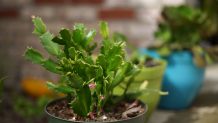“You can’t keep social distance when you’re harvesting broccoli,” said Jorge, even if you want to – the rows are too close.” During the last year working in the fields, Jorge says masks and sanitizing supplies have been scarce and the conditions ripe for infection. “One of our co-workers died just 22 days ago. He had no family here, so we had to pitch in to send his body to Mexico,” said Jorge.
An investigation by NBC Bay Area over the last six months found that as COVID-19 created a crisis in agricultural fields, warehouses and packing plants throughout California, state agencies charged with protecting those workers were slow to respond and took little action. Workers who earned about $14 an hour say they’ve had to pay as much as $30 for a COVID test. As positive cases decrease elsewhere in the state, researchers tell NBC Bay Area that 1 in 3 farmworkers is now testing positive for the coronavirus.
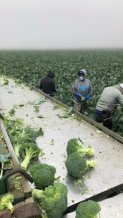
“We found that many of them (farmworkers) were going to work with infection,” said Dr. Brenda Eskenazi from the U.C. Berkeley School of Public Health. “I think what COVID has done is it's pulling back the curtain on all of the inequities that farmworkers have experienced.” Dr. Eskenazi led a team of epidemiologists in assembling an in-depth study of more than a thousand farmworkers in the Salinas Valley last summer and fall.
Get top local stories in San Diego delivered to you every morning. Sign up for NBC San Diego's News Headlines newsletter.
As part of their research the team interviewed and conducted throat swabs as well as blood and saliva tests of 1045 farmworkers in Monterey County from July through November 2020.
“The main reason why they were going to work was that they felt okay enough,” said Dr. Eskenazi. “But in addition, they went to work because they were fearful of losing their jobs.” The study found 57%, nearly 3 of every 5 workers, reported going to work sick.
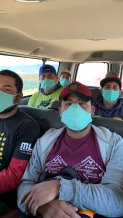
“A large proportion of them are food insecure, meaning they do not have enough food to feed their families,” Dr. Eskenazi said.
U.S. & World
The researchers found 13%, more than one of every ten workers, had active COVID infections - and 20% tested positive for antibodies, suggesting one in five workers had a previous infection.
More recently, Dr. Eskenazi told NBC Bay Area that in the post-study time period as many as 1 in 3 people in the farmworker community now tests positive for COVID-19. More alarming, she says testing for the coronavirus has dropped to less than 5 percent of what’s needed to keep the community safe. “They are frightened to access services. So, we are seeing a population that's already at fear and at high risk,” said Dr. Eskenazi.
But until recently those charged with protecting these workers didn’t seem to be doing much about it. NBC Bay Area’s Investigative Unit dug through CalOSHA inspection records and found no action taken against any entity relating to COVID protocols or violations until August 2020. Even then, The Investigative Unit’s analysis found there have been a total of 22 citations for COVID protocol violations issued statewide through February 2021. Almost half of those violations cited by CalOSHA (10) have been issued against farm labor organizations in Monterey County.
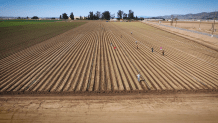
“We know that there are more people out there that have concerns and issues,” said Julia Montgomery, chief general counsel for California’s Agricultural Labor Relations Board (ALRB) an agency set up in 1975 to protect the rights of agricultural workers. Montgomery said both the state and federal government are making efforts to reach farm communities, but given that the large number of workers - estimated at about 800,000 in the state - with up to 60% undocumented, progress is difficult.
“We have received phone calls and information from people who call and ask for information but don't want to come forward and file a charge because of…fear of retaliation, fear of losing one's job and sometimes fear of being blacklisted as well, which is a real concern in this community,” said Montgomery.
According to data Montgomery provided in response to NBC Bay Area’s public records act request, from the start of the COVID pandemic in March 2020 through February 24, 2021, the ALRB has taken only 9 actions against companies and organizations relating to COVID and health issues statewide, 4 of them in Monterey County.
“It is not enough. We know for a fact that there are a lot more (possible violations) out there,” said Montgomery. The ALRB actions were taken after complaints were filed, including a lack of COVID protection in the fields and mistreatment of workers who did get sick. “Unfortunately, at the ALRB, we can only respond to a charge that is filed with us. We don't have independent ability to go out and cite someone. So, they (workers with complaints) have to come to us.” Montgomery said the ALRB could do more if it had the power to initiate actions.
The Investigative Unit visited a half dozen companies in Monterey County that had been cited by CalOSHA for violations such as not providing proper social distancing, masks or other protection for their agricultural workers.
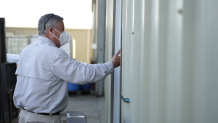
“To me, it was not fair,” said John D’Arrigo, the man in charge of one of those companies, D’Arrigo Brothers Company of Salinas. D’Arrigo is a third-generation grower. He’s served as CEO and President of D’Arrigo Bros since 1992.

CalOSHA fined D’arrigo Bros. $7,650 on December 23, 2020, for three separate instances, including workers wearing no masks, failure to maintain proper distance and not providing barriers between workers.
D’Arrigo said the workers took the masks off only to take a break. He admits that his workers sometimes might get too close in the field because of the nature of the work. He says he’s working on installing partitions on harvesting machines, but he says that takes time, money and manpower. He said he’s asked Cal OSHA for more time and patience as he tries to adapt to changing COVID protocols and rules. But he said his pleas to work with Cal OSHA have not borne results, leaving him frustrated.
“We pleaded our case” to CalOHSA, said D’Arrigo. “And so unfortunately, I'm going to lawyer up and I'm going to go fight this because if we're wrong, we're wrong. But if I feel we're not wrong, I'm going to fight it.”
D’Arrigo said that simple economics compels him to protect his workers. “We're so short of workers, I've got to take care of the ones that I have and want them to stay here,” he said.
When asked if he was doing enough to protect his workers D’Arrigo was unequivocal. “I believe yes,” he said. I believe we are doing everything that we are asked to do and required to do, and in some cases, we try to say, what can we do more?
To prove that, D’Arrigo, showed NBC Bay Area’s Investigative Unit around his headquarters outside Salinas. He demonstrated what he’s doing to make the environment safe for his 2,000 or so workers, including providing full health insurance to workers and their families.
Recently D’Arrigo said he and others successfully persuaded Governor Newsom to put agriculture workers in the Tier One B in the line to receive new COVID vaccines. And in late February D’Arrigo opened his headquarters facilities to serve local county health officials as a public COVID vaccine distribution site where more than 400 farmworkers signed up to get a first round of shots.
When asked about the U-C Berkeley study showing 13% of farmworkers in his area had tested positive for COVID-19, D’Arrigo said “That's very disturbing. That should not happen. It's not good for the person, their family, the company, the food supply.”
SO MO CO (Southern Monterey County) Labor Supply was yet another company fined by CalOSHA on December 30, 2020 after a September 29, 2020 inspection on Hudson Road in Soledad.
The company was fined $5400, according to CalOSHA records, for not providing enough shade for workers in the fields and “Prior to, and during the course of the inspection, including but not limited to, on September 29, 2020, the employer failed to effectively implement its injury and Illness Prevention Program in that it did not identify, evaluate, or correct unhealthy conditions or work practices relating to COVID-19 that affected its employees who were working outside harvesting kale. The employer did not furnish sufficient shade to enable employees using the shade during breaks/meals to maintain a safe physical distance from coworkers of at least six feet in all directions.”
When asked about the shade and lack of social distancing SO MO CO, Labor Supply owner Jon Pier Azcona said “Yeah. According to the letter of the law that probably happened.”
Azcona’s assistant who is in charge of Human Resources told NBC Bay Area she was in the fields for that inspection and “that it wasn’t harvesting kale but hoeing wheat” that workers were engaged in.
“I saw everyone with face coverings. When I saw them they were all wearing masks,” said Human Resources / Safety Assistant Maria Calderon.
“We were in compliance,” said owner Azcona. “We want to have compliance. We ultimately paid the fine for not having the shade up properly,” said Azcona. “We were guilty of that. We negotiated the fine down. Yeah, it’s impossible to put up enough shade to have everyone stay away from each other six feet (for social distancing.)”
Azcona said he can’t get enough workers these days, and that any more impacts from COVID could mean crops never get harvested and actually rot in the fields That, he said, would drive up prices on fresh produce for all of us at grocery store and reduce the choices of the food we eat every day.
Another company, Al Pak Labor, was cited on December 24, 2020 for not requiring or ensuring employees had face masks, and not providing ensuring workers maintained social distance while harvesting lettuce. An Al Pak representative provided a written statement to NBC Bay Area.
"With over 700 employees, the only violation recorded during this visit was due to two employees who, upon returning from a water break, did not appropriately replace their face masks. This also resulted in inadequate social distancing. Upon learning of this, AL PAK immediately reminded crew supervisors that all employees must adhere to all COVID standards at all times." (full statement)
The Elkhorn Packing Company was cited on January 6, 2021, for not ensuring workers maintained social distance, for not providing sufficient shade during rest breaks so employees could physically distance from each other, and for not providing barriers to protect workers from infection. An Elkhorn Packing representative responded via email, “We do our utmost to help ensure our employees are safe and will continue taking steps to prevent the spread of COVID-19.” (full statement)
River Family Farms and The Grower's Company were also cited for various failures, including a lack of training, masks, and social distancing. Neither company responded to NBC Bay Area's requests for comment.
Farmworkers told NBC Bay Area the measures taken by companies and the government were not enough to avoid the COVID crisis that has devastated their communities. Despite their status as essential workers - a lack of citizenship, poor access to medical care, as well as crowded living and working conditions have made them easy targets for COVID infection. Research from the Harvard Center for Population and Development Studies showed Latinos in the 25 to 54 age group have a 7-fold to 9-fold higher risk of death from COVID than the white population.
As they see neighbors get sick and die from the coronavirus, farmworkers like Jorge and Araceli have done their best to cope. “COVID has taken so many people, said Araceli.”
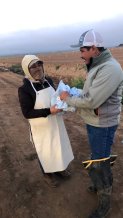
Araceli has been taking matters into her own hands, with the help of "Lideres Campesinas," a network of women farmworkers that empowers women so they can become agents of social change. The group has provided Araceli masks and sanitation supplies to hand out to farmworkers. While she's in the fields, Araceli talks to the workers about vaccines and health. "We're trying to inform all the workers that it's important to take care of your health and protect your family," said Araceli.
Like many of people dealing with the pandemic, Araceli found herself having to cultivate a mental distraction, focusing on caring for her home garden, something she says was a survival tactic. “They distract me and relax me,” she said. “They’re a part of me now, and part of my family.”
